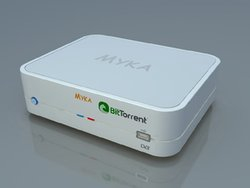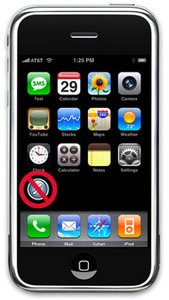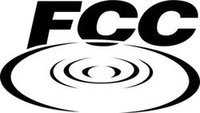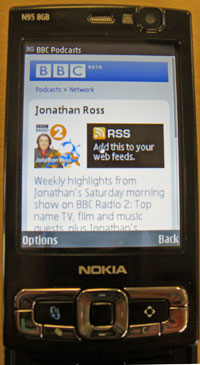Here’s a summary of the week’s digital lifestyle action on last100. Note that you can subscribe to the weekly wrapups, either via the special weekly wrapup RSS feed or by email.
Top digital lifestyle news
The big Internet TV news this past week is that Joost is reportedly switching strategy and will be bringing its service to the Web browser. Last100 editor Steve O’Hear wrote that the move “would signal an admission that Joost’s strategy to build its service around the kind of ‘lean back’ experience that it hoped to deliver via a full screen desktop application has largely failed.” Also Steve points out that the Internet TV landscape has changed dramatically — there are now a plethora of companies serving a similar mission to Joost, including big hitter Hulu, the NBC/Fox joint venture.
We also reported on Canadian broadcaster CBC’s decision to release a TV show for download, free, legal, and via BitTorrent; YouTube announced the winners of its annual video awards; and a new set-top box from Myka downloads and delivers torrents right to your television.
On the mobile front, the U.S. Federal Communications Commission announced that the big winners in the 700 MHz wireless spectrum auction were, indeed, Verizon and AT&T, the two biggest players in the industry. Dan Langendorf says that now the wait it over, it’s time for the U.S. mobile industry to innovate.
Following comments from Adobe, we also looked at the implications of Flash on iPhone (or the lack of). In a post titled ‘Who needs Flash on iPhone more? Adobe or Apple?‘, last100 editor Steve O’Hear asked: Is Adobe committing itself to building the missing version of Flash that Jobs demands? Or does Adobe really believe it can go-it-alone? “Without Apple providing the hooks to enable Adobe to tap into the iPhone’s Safari web browser,” Steve contended, “it’s hard to see how a Flash plug-in could be implemented. Instead, Adobe might be able to create a work around: some kind of stand-alone Flash Player that opens full screen to play certain content.”
In the same week, Microsoft hedges its bets and licenses Flash Lite from Adobe.
In Digital Music, LimeWire’s DRM-free music store launched; and there have been reports that Apple is exploring an “all you can eat” subscription model for the iTunes Store.
That’s a wrap for the week!
 Gizmodo
Gizmodo There are
There are  Joost (
Joost ( The jockeying for position is
The jockeying for position is  Google committed to bidding the minimum of $4.66 billion, which triggered a rule that the winner of the 700 MHz C-block spectrum would have to open its network to any device, any application. Just by bidding, Google dictated the new rules of the game — rules that Verizon must now follow.
Google committed to bidding the minimum of $4.66 billion, which triggered a rule that the winner of the 700 MHz C-block spectrum would have to open its network to any device, any application. Just by bidding, Google dictated the new rules of the game — rules that Verizon must now follow. AT&T won 227 regional licenses around the U.S. Those licenses, along with the piece of the 700 MHz puzzle it already owned, allows AT&T to further enhance the quality and reliability of its existing network and wireless broadband.
AT&T won 227 regional licenses around the U.S. Those licenses, along with the piece of the 700 MHz puzzle it already owned, allows AT&T to further enhance the quality and reliability of its existing network and wireless broadband. Courtesy of the
Courtesy of the  Updated: Adobe says it will need Apple’s support to bring Flash to iPhone (see end of post).
Updated: Adobe says it will need Apple’s support to bring Flash to iPhone (see end of post). I know you can’t wait — it’s better than who is going to make it to the Final Four. OK, not really, but the largest and most lucrative wireless spectrum auction in U.S. history ended today, and we’ll know within 10 days who won the
I know you can’t wait — it’s better than who is going to make it to the Final Four. OK, not really, but the largest and most lucrative wireless spectrum auction in U.S. history ended today, and we’ll know within 10 days who won the  It comes as no surprise. Apple is said to be in discussions with the major record labels to allow customers unlimited access to the entire iTunes music library in exchange for paying a premium for iPod and iPhone devices.
It comes as no surprise. Apple is said to be in discussions with the major record labels to allow customers unlimited access to the entire iTunes music library in exchange for paying a premium for iPod and iPhone devices. The BBC continues to ramp up its mobile efforts with targeted versions of its podcast directory for Sony’s PlayStation Portable (
The BBC continues to ramp up its mobile efforts with targeted versions of its podcast directory for Sony’s PlayStation Portable (